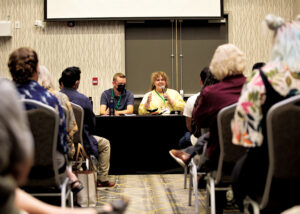This is a follow up sermon in the two-part series I preached at Crosshill Mennonite Church called ‘The Work of Love’. The first part can be found here.
This morning we heard the text of the third letter of John, a book which takes the cake for being the very shortest book of the New Testament. Last Sunday the sermon was on the work of love, and this Sunday will be part two of the same themes: the centrality of Christ and the importance of love for the Christian journey. Where last Sunday the main themes were the gifts of love and forgiveness, this week the theme will be doing the work of love as a response to injustice, and how love fits in between weakness and power.
The main task given to us in the third letter of John is in verse 11: ‘Beloved, do not imitate what is evil, but imitate what is good. Whoever does good is from God; whoever does evil has not seen God.’ When we are told to imitate what is good, we are told to make ourselves conform to the image of God. If we are made in the image of God, and if we are told to imitate what is good, then the goal is to let the inner goodness that we all possess be revealed. It’s not as though we are defined by our fallen nature, and it is not as though we are defined by our sinfulness or our separation from God. Instead we are defined by God who created us good, and we are to conform to our essence, we are told to imitate what is good.
The verse from 3 John doesn’t just say that we must imitate what is good, it also says that we must not imitate what is evil, and this sets up a dualism. As is common in John’s writings, we are faced with a choice: on one hand is good and on the other hand is evil, and this dualism is presented simply, which makes sense because the letter is only a paragraph or so long. As I mentioned last Sunday, dualisms like this may seem simple on the surface, but underneath they are complicated. So too look deeper into the context of the third letter of John I want to return to the first letter of John. Chapter 1 verses 5-10.
‘This is the message we have heard from him and proclaimed to you, that God is light and in him there is no darkness at all. If we say that we have fellowship with him while we are walking in darkness, we lie and do not do what is true; but if we walk in the light as he himself is in the light, we have fellowship with one another, and the blood of Jesus his son cleanses us from all sin. If we say that we have no sin, we deceive ourselves, and the truth is not in us. If we confess our sins, he who is faithful and just will forgive us our sins and cleanse us from all unrighteousness. If we say that we have not sinned, we make him a liar, and his word is not in us.’
The text shows how God is light and not darkness, and this is an important image. Typically when we think of goodness we think of light, and when we think of evil we think of darkness. When I watch movies like the Lord of the Rings or the Chronicles of Narnia, the forces of good are bright and illuminated and the forces of evil are dark and hidden, and there are good reasons that these films use light and dark imagery to enhance their often Christian messages. The significance of this opposition between light and dark, and good and evil goes a lot deeper than appearances and becomes something deeper than a juxtaposition of colors or shades.
The important reason for us, why good is associated with light, and evil associated with darkness, is that in light all things are revealed and visible. When light is brought into our lives it reveals us for who we truly are: God’s light casts out darkness and deception, and empowers followers of Christ to be lights in the world. Being tasked with this, when we are lights in the world and in the lives of others our light illuminates and reveals the hidden and dark things, and this takes away their power.
Being brought into the light, means that things are revealed and that the power of darkness is overcome. This is because the hold that evil has on the world has a lot to do with keeping things hidden. When we are honest with each other about our struggles, or when we stand up and speak out about injustices we shed light on the dark places of the world.
This connects up with the topic of last week’s sermon: the idea that the work of love is our highest task, and that the work of love means remaining open and vulnerable even if it means taking a risk to shed light on dark things. Now last week I also mentioned that remaining open and vulnerable is different than putting up with abuse and injustice. Loving someone else doesn’t mean allowing them to fall into unhealthy and destructive patterns, and loving others involves placing certain kinds of boundaries. I think it has been easy for us as Mennonites to emphasizes our boundaries and separation from the world, and I would be the first person to affirm this idea. There are lots of things about secular culture and society that are worth being separate from. I am committed to being set apart from and opposed to things like the love of money, consumerism, violence, and the oppression of minorities, but in order to not participate in the injustices of the world I must understand them and engage with them. I think an active and engaged approach to being separate from the world is better than a passive and uninformed one.
While being separate from the world I think that we have become comfortable with the idea that the problems of the world are not our own. ‘So what if there are problems out there if they haven’t reached us.’ But Christ shows us a different way. Rather than remaining totally cut off from the world (on one hand) or totally immersed in the world (on the other hand), Christ remained separate from his host culture, while actively critiquing it. Christ critiqued culture in a way that will be familiar to us, because he did it by revealing injustice and by bringing light to it.
When we see injustice in the world, and when our love for creation and the people around us is returned with violence, oppression, and the misuse of power, then we have a responsibility to do something about it. But, our Mennonite heritage tells us that we cannot use power like the world uses power. It is tempting, when we are wronged, or when injustice is done, to return to the law-like attitude we discussed last week. If we witness oppression in the world, whether the victims are ourselves or others, then it is tempting to fight back and to use power as the world uses power. Many injustices result from power imbalances. When workers don’t receive fair wages, when governments use military force to control their citizens, when people of different races are treated badly by the white majority, and when women receive less opportunities than men – when these injustices take place, the problem is an imbalance in power.
\Now we live fairly empowered lives. We are able to travel freely and easily without needing to worry about checkpoints or the military, or even the poverty that stands between many people and where they need to go. We are free to do what we please, and we are able to work to provide for our families. Surely we experience injustices, but the injustices we see in Egypt and Syria right now, for example, are far easier to name.
The question I would like to ask is, if we found ourselves burdened with injustice, and if we were persecuted and oppressed, how would we respond? Maybe if we think about our response in this general way, then we’ll receive some insight into the small ways we interact with others.
I think that the temptation is always present, to use the power that we see in the world to fight injustice. This approach would say that wherever there is oppression and power imbalance the oppressed group needs to fight back with the same force that hurt them. Perhaps we can see this when we are wronged and we want to show the other party how it feels to be wronged. But, the passage from the first letter of John can help us here.
Earlier when I mentioned that the key to living out love is revealing and shedding light on who we really are as children of God. This act of shedding light on our identity is also important when we are a light in the world. Instead of meeting power with equal and opposite power, we are called to weakness, because weakness reveals the injustice in the world, and brings light to it – taking away its power and opening the way for justice. Here I think of God’s self-emptying in the incarnation: Christ coming to earth as a man. Rather than using divine power and omnipotence God chose the model of loving relationship to offer humanity salvation.
This model of weakness is given to us by Jesus when he said, in his context, that if a Roman soldier forces you to carry his pack for one mile, carry it a second mile. This small piece of advice contains within it a whole new approach to injustice. This is because, during the time of Christ a Roman soldier could legally ask a citizen to carry his bag for a mile. This was established as a fair practice in the eyes of the Roman authorities. Some of us may have heard this explanation of Jesus’ words already, but the truth of the passage is a little deeper. When a citizen, following Jesus’ words, would carry the soldiers pack for one mile then the letter of the law would be fulfilled, but when the citizen continued to carry the pack for a second mile, on their own accord, then the story gets interesting.
When the citizen carries the pack for one mile, the law is followed and the soldier is within his rights, but, when the citizen decides to take the pack a second mile then the soldier is breaking the law, because he can only ask a citizen to carry his pack for one mile. Anything past that is against Roman law, which means that the soldier could be disciplined for breaking the law. The citizen knows and understands this, and goes the extra mile to put the soldier in a tough position. In doing so the citizen sheds light on the injustice, and makes plain the fact that the law is unjust. This act of weakness sheds light on the injustice of citizens being used as slave labor for military purposes. By carrying the soldiers pack an extra mile the citizen is showing any observers that the system is broken, and is doing so without exerting power like the Roman soldier would. Instead of following the zealots, who would fight oppression by killing a Roman soldier, the followers of Christ would use weakness as their strength by revealing injustice for what it was, rather than fighting injustice with worldly power. This is much more consistent with the work of love, which doesn’t repay evil for evil, or betray itself by becoming violent in order to fight violence.
The weak approach to injustice has its own strength, and that strength comes when we reveal injustice for what it truly is. When we truly see the effects of our actions or the actions of others then things become real to us. It’s very easy to go about our lives and not see how we participate in injustices, and it’s very easy to participate in systems of oppression when we don’t see their results.
But, everything changes when injustices hit close to home, and maybe a few examples from my own life will help. I remember going to a rural high school and hearing racist comments now and again, comments that stereotyped Asians or African Americans and so on – and I didn’t think much of it, until I went to the University of Waterloo and lived at Conrad Grebel, surrounded by people from different cultural and ethnic backgrounds. It didn’t take long for me to realize that I was no longer in a place where one racial background was the majority, and it took even less time for me to realize that the sort of things I heard in the predominantly white high school I had attended were out of the question in the University atmosphere.
This shift in perspective was especially present for me in another way: my roommate at Conrad Grebel was not your typical born and raised Mennonite from Southern Ontario, but instead Adam was a Shi’a Ismile Muslim who went to the Mosque, read the Koran, and prayed to Allah. We had a great roommate relationship, we weren’t best friends but we helped each other out, and we were both more interested in our studies than in having a glamorous social life, and his side of the room was messy and my side was clean and we dealt with that. And because Adam and I became friends I started noticing things. I started noticing how certain people I knew in Christian circles treated Muslims like the enemy, or just people to be converted, and I started noticing how when Hollywood needs a villain they pick someone from the Middle East, and I started noticing how people didn’t speak up when Muslims were all painted with the same brush. This injustice, this power imbalance, became real to me because it hit close to home.
The same thing happened when a friend of mine told me his brother was gay, I started noticing how the word ‘gay’ was tossed around like a curse-word, or how gay people were harassed and made fun of.
And this is the problem, we talk about love and we find it relatively easy to love our own, but the real test of love, the real work of love comes when we are called to love someone who is different, someone with different values, someone from a different culture who speaks a different language, someone with a different sexual orientation, or someone who just doesn’t fit in. This is the real test of our ability to love, especially if we haven’t experienced being treated badly because of the ways that we are different. If the injustices of the world haven’t hit us close to home then it is especially difficult to show compassion and to imagine what it would be like to be in someone else’s shoes: perhaps someone with a disability, or someone living in poverty, or someone without work, or someone who doesn’t speak English well. But the work of love is important regardless of whether we have experienced being oppressed or trod under foot – regardless of our experience we are called to love others first.
Many Christians seem to be more interested in the power that comes with being right, than the weakness that is required to be good. We are often so preoccupied with having the truth, and holding up the Bible as ultimate knowledge, that we forget to read it – we forget that the gospel is good news for the poor and marginalized and oppressed and anyone who is looked down upon or derided.
So my prayer for us this morning is this, that we would be made uncomfortable in our lives, that we would come face to face with injustice and oppression, that the imbalances of power in the world would be laid bare and revealed. I hope and pray against comfort and calm, that we would be taught the importance of love first hand, and that we would be given experiences outside of our comfort zones. We only know who we are when we engage with the world we are not, and we only live out our Christian convictions if we are tested and challenged to do so in an ever-expanding world which desperately needs the work of love.
Like we hear in first John chapter three verse 18, ‘Little children, let us love, not [just?] in word or speech, but in truth and action.’ I hope that we can bear out the truth of the gospels in action through the work of love, which is both the work of love that we engage in, and the great work of love that was initiated by God. Following from the first great gift of love, let us also love God, ourselves, and others no matter how different those others may be.
Amen






